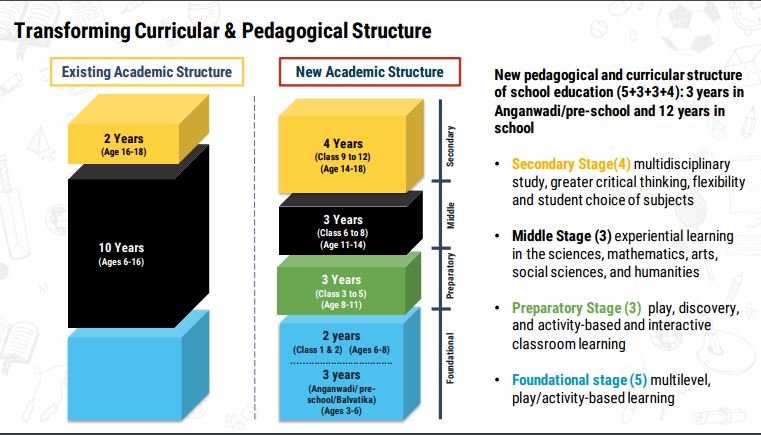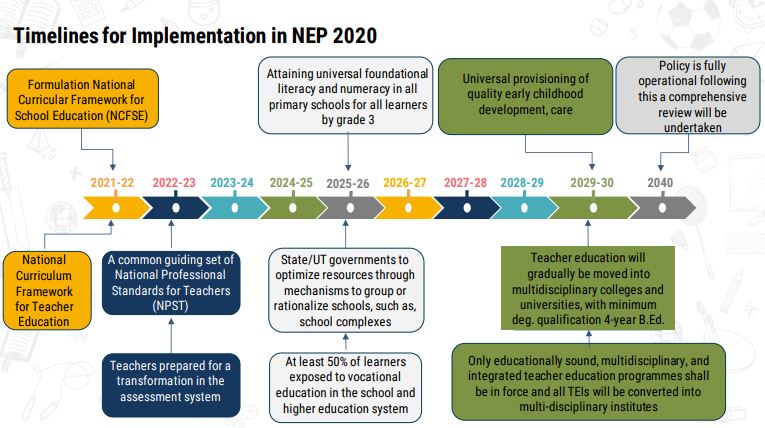The New Education Policy will replace 10+2 System with 5+3+3+4, time to celebrate the changes. It is pertinent to note the long timeline and goals which go on till 2040.
The long wait is over, the new education policy is announced by Ministry Of Human Resources And Development (MHRD). It highlights a new spin towards practical work.
NEP 2020 has been the break down of the existing 10+2 structure and introduction of the 5+3+3+4 structure of school education.
The policy aims to transform pedagogical structure away from exiting 10+2 years to more inclusive and holistic elementary to secondary stage transition.
Read all you need to know about the highlights of the NEP and acknowledgment of tackling the commercialization and profiteering parallel to the current system.

Expected Outcomes
-
Universalisation of Access – from ECCE to Secondary
-
Ensure equity and inclusion
-
Bring back 2 crores out-of-school children
-
Attain SDG goals of retaining all children in schools until completion of secondary education
-
Improve Quality and achievement of learning outcomes – Foundational Literacy & Numeracy (FLN)
-
Focus on 21st century skills in teaching, learning and assessment
-
Resource sharing- School complexes
-
Effective Governance - separation of powers and common norms
-
Overcoming the language barrier in learning
-
Common standards for public and private school education
How children will learn ?
Transforming Curricular & Pedagogical Structure

1. Foundational Stage (5 years): For ages 3 to 8 years, the foundational stage has been suggested. Universal Access to Early Childhood Care & Education (ECCE), this is how preschool and lower primary school would look like.
Universal Access For children of 3-6 years: access to free, safe, high quality ECCE at Anganwadis/Pre-school/Balvatika
Foundational Learning Curriculum For age group of 3-8 divided in two parts:
(i) From age 3-6 in ECCE and
(ii) Age 6 to 8 in class I and II in primary school
-
Preparatory Class Prior to the age of 5 every child will move to a “Preparatory Class” or “Balvatika” (that is, before Class 1)
-
Multifaceted Flexible, multi-level, play-based, activity-based, and inquiry based learning
2. Preparatory Stage (3years): This is for ages 8 to 11 or classes 3 to 5. The focus would shift to play, discovery and activity based and interaction classroom learning. The focus till this stage would remain on development of language and numeracy skills, in accordance with the cognitive development of a child. Medium of instruction till Grade 5 would be home language or mother tongue or local language. Three languages would be taught to all students – and states would decide which ones.
3. Middle Stage (3years): Referring to the classes 6 to 8, the new structure aims at transforming the pedagogy from the existing system to a more experiential learning in the sciences, mathematics, arts, social sciences and humanities. Focus would be on critical learning objectives and not on rote learning.
4. Secondary Stage (4years): This includes classes 9 to 12 or the secondary and the higher secondary as we know them today. The changes suggested at this stage include a multidisciplinary study where students would be able to pick and choose any set of subjects from the available structure. The focus would be on greater critical thinking and flexibility, allowing the child to pick subjects as per their interests – even technical and arts.
Contest Alert
NexEd Bloggers Contest 2020
For Teachers
Lil Bloggers Contest 2020
For Students
How Will Assessment Look Like?
Examinations in grades 1 to 8
Key stage assessments
Census assessments at key stage in classes 3, 5 and 8 to track achievement
Achievement of critical LOs
Testing to focus on achievement of essential learning outcomes
Moving away from rote learning
Assessment of core concepts and knowledge, higher-order skills and its application in real-life situations. Moving away from rote learning.
Results of school examinations
The results of school examinations will be used only for developmental purposes and for continuous monitoring and improvement of the schooling system
Reforming examinations in grades 9 to 12 including board exams
Board exams will be made ‘easier’, as they will test primarily core capacities/competencies
Viable models to be explored: annual/semester/modular Exams; two parts exams - objective type and descriptive type.
Guidelines will be prepared by NCERT, in consultation with SCERTs, Boards of Assessment (BoAs), and PARAKH
Beginning with Mathematics, all subjects could be offered at two levels
Teachers to be prepared for a transformation in the assessment system by the 2022-23 academic session
Each School Board shall ensure equivalence of academic standards in learner’s attainments
Standards, norms and guidelines for School Boards through PARAKH National Center
Cyber Safety Initiatives by NexSchools
NexSchools celebrates Cybersecurity Awareness Month in October 2020
Cyber Safety For K12 Schools -Cybersecurity Awareness Month
Wall Of I Support For Cyber Safety Awareness
NexSchools Runs The Largest School Cyber Safety Awareness Campaign
NexSchools Becomes STOP. THINK. CONNECT. Partner
School Children Making A Difference With Blogs
Celebrating Success Stories Of Lil Bloggers
NexSchools Announces Successful Completion of Cyber Warrior Ambassador Certificate Course
Focus on children with disability
-
State governments will be encouraged to hire adequate number of counsellors and teachers (to be shared across school complex)
-
Differentiated interventions and suitable infrastructure development at schools to make access easier for children with disability
-
The role and expectations of principal and teachers will explicitly include developing a caring and inclusive culture at school
More Highlights
There is lot ot celebrate and see the face of education changing with this education policy. Some highlights:
The results of school examinations will be used only for developmental purposes and for continuous monitoring and improvement of the schooling system

-
Reduction in Curicullum
-
Emphasis to Mental and physical health and well-being:
-
Reduce weight of school bags
-
Mandatory skills : Health and Wellness - Mandatory skills to be imbibed by all
-
Inclusive and caring culture at school
-
Establishment of National Research Foundation(NRF)
-
NRF will stimulate and expand research in India
-
Results of school examinations
Our Take on NEP
On paper it is a visionary and futuristic policy. This futuristic policy has left the private education, preschools, and schools running for profit for years are now in lurch. Parents are celebrating the shift, they are more than happy that government acknowledged the fact of profiteering.
Say No to Commercialization Of Education
Welcome step to recognize and acknowledge the fact that India has rampant commercialization and profiteering at all levels of education. This policy is unambiguous and explicit that education must be NOT FOR PROFIT activity and enterprise society. How does the government curtail the private education and replace it with the quality and affordable education needs more clarity.
Denial of Shadow Economy Running For Profit
This policy acknowledges the for profit education existence by giving it due place. It is also grave concern the rampant shadow economy which is fearlessly runs education as a for profit business. The policy does not quite explain or suggest how a billion dollar education industry in India possibly be out of system. How quality education with affordability would be achieved in the next twenty years as mentioned in the goals and timeline?
“Education is a charitable activity and commercialization of education is not at all acceptable.”
The goals and budgetary allocation year on year and aggressive systematic groundwork, transparency and effective implementation with accountability would be key to success. The policy is progressive, it is going to have huge impact on the young workforce of the country, however it is crucial to get this right.
References & Source: National Education Policy -Ministry of Human Resource Development (MHRD), India
]